Introduction to the Concept of Cultural Intelligence and Teamwork.

Topic 1: Introduction to the Concept of Cultural Intelligence and Teamwork.
Definitions:
-
Intelligence – an innate mental ability that includes analysis, planning, problem-solving, abstract thinking, and learning processes (Gottfredson, 1997, cited in Sternberg, Kaufman, 2011).
-
Competence – developed potential/ability for desired activity in practice (Lindberg, Rantatalo, 2015).
-
Communication – the method of conveying information individually or in a group (Guffey, 1998).
-
Culture – interconnected values, social rules, lifestyle, and models of interpretation and behavior (Schachtner, 2014).
-
Cultural diversity – interaction of different cultures based on mutual respect (Fylkesnes, 2018).
-
Cultural differences – the cultural, economic, political, and social conditions of each country, which shape the behavioral norms, customs, and traditions characteristic of each country/nation (Fee and Gray, 2011).
Cultural Intelligence (CI): How culturally educated are you?
-
CI is the individual’s ability to adapt their behavior to be effective and respectful in a multicultural environment.
-
A person with a low CI index cannot evaluate information from people of different cultures or cultural backgrounds, and communication with such an individual often fails.
-
In contrast, a high CI index increases productivity in the workplace and improves negotiation skills. Therefore, companies are likely to assess whether employees from different cultural backgrounds can cooperate effectively.
CI is calculated by examining the following criteria:
- The internal desire to learn about different cultures,
- Understanding cultural differences,
- A sense of flexibility,
- Behaviour when interacting with people from different cultural backgrounds.
Team is defined as two or more people who are connected to each other and influence one another to achieve a common goal (Stoner J.A.F., Freeman R.E., Gilbert D.R.Jr., 2001, p. 489).
According to V. Barvydienė and J. Kasiulis (2001), highly effective work groups are often referred to as teams.
R. Bleckhard (1982) defines a team as a group of people, consisting of two or more individuals, who work together to perform a specific task.
A team is a group of individuals working together, where the presence of all members is necessary to achieve a common goal and satisfy each group member’s individual needs. This group consists of both similar and diverse people (Barvydienė V., Kasiulis J., 2001, p.75). This is the definition that best describes a team.
Key characteristics of teamwork according to B. Vijeikienė and J. Vijeikis (2000):
- Collaboration
- Mutual assistance
- Balanse between uniformity and diversity
Teamwork becomes highly important when it is necessary to efficiently achieve goals, quickly adapt to constantly changing consumer demands, implement new complex technologies, and professionally solve problems.